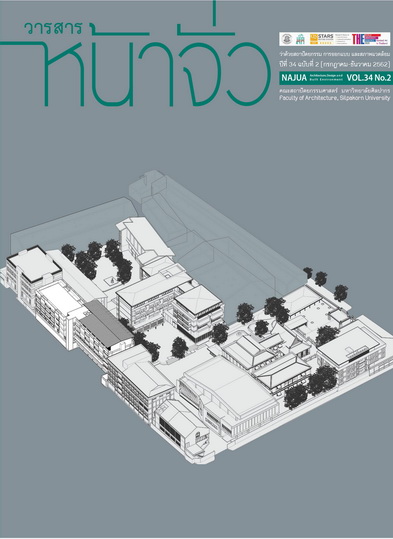Achievement Motivation Characteristics in Construction’s Supervisors: A Case Study of Japanese Construction Company in Thailand
Keywords:
Supervisor, Characteristics, Achievement Motivation, Construction Management, Japanese Construction CompanyAbstract
Meechai Noipitak
Department of Design and Project Development, Robinson Public Company Limited
Tayagorn Charuchaimontri
Faculty of Architecture, Silpakorn University
This study aims to determine not only the level of achievement motivation, but also the relationship between personal factors and level of achievement motivation of construction’s supervisors in Japanese construction company in Thailand. It was conducted by collecting 373 questionnaires, divided into 17 questions from 7 topics about the achievement motivation and 4 questions about the organization.
It is found that most construction supervisors had achievement motivation characteristics in individual responsibility, knowledge of result of decision, energetic, organizational skills, risk-taking, anticipation of future possibilities and competition, respectively. Furthermore, the Japanese construction company encourages and educates knowledge for staffs in the organization following Japanese culture. Moreover, it is found that male supervisors have higher achievement motivation than female ones in almost all the aspects. The more experience supervisors have, the higher achievement motivation in anticipation of future possibilities and responsibility have.
References
- Beach, D.S., (1957). Personnel : The Management of People at Work. London: Macmillan.
- Borisutnarudom S., (2014). Khunnalaksana khō̜ng phū khūapkhum ngān dān rǣng čhūngčhai fai samrit nai ngān kō̜sāng. (in Thai) [(A chievement motivation characteristics in construction’s supervisors], Thesis, Master of Science in Construction Project Management. BKK: Silpakorn University.
- Hiroshi I., (2011). Kānbō̜rihān satai Yı̄pun. (in Thai) [Japanese style management].
- Jinowat O., (2014). Khunnalaksana sūan bukkhon watthanatham kānthamngān bǣp Yı̄pun læ rǣng čhūngčhai thı̄ mı̄ phon tō̜ prasitthiphon kān patibat ngān khō̜ng phanakngān Khon Thai nai khēt nikhom ʻutsāhakam čhangwat Phra Nakhō̜n Sı̄ ʻAyutthayā. (in Thai) [Personal Characteristics,Japanese Work Culture and Motivation Factors Affecting Thai Employee’s work Effectiveness in industrial Estate Areas in Ayutthaya Province]. BKK: Bangkok University.
- Khonthong V., (2013). Kānsưksā rǣng čhūngčhai khō̜ng phūchai rǣngngān chāo Thai læ tāng chāt nai thurakit kō̜sāng ʻākhān. (in Thai) [Study of Motivation of Thai and Oversea Workers in Construction Business]. Master of Engineering, Nakornratchasima: Suranaree University of Technology.
- Kotler, P., (2002). Principles of Marketing. New York: Prentice-Hal.
- Leasatienwong J., (2012). Patčhai tō̜ rǣng čhūngčhai patibat ngān khō̜ng phanakngān sāi chāng khō̜ng bō̜risat kō̜sāng khanāt lek nai ʻamphoē mư̄ ang Nakhō̜n Rātchası̄mā. (in Thai) [Factor Motivation Operation Technical staff of the construction comapany in Muang Nakorn Ratchasima]. Master of Engineering, Nakornratchasima: Suranaree University of Technology.
- Mc Clelland, D. C., (1961). The achieving society. New York: the free press.
- Mehrabian, A., (1968). An Analysis of Personality Theories. New York: Prentice-Hal.
- Ministry of Labor, (1998). Phrarātchabanyat khumkhrō̜ng rǣngngān Phō̜.Sō̜. 2541. (in thai) [Labor Protection Act 1998]. BKK: Ministry of Labor.
- Nawaratana Na Ayudhaya T., (2006). Nakbō̜rihān. (in Thai) [administrator].
- Office of the Civil Service Commission. (2010). Khūmư̄ kānkamnot khwāmrū khwāmsāmāt thaksa læ samatthana samrap tamnǣng. (in Thai). BKK: Office of the Civil Service Commission.
- Rasameethamchoti S., (2005). Nǣothāng kānphatthanā sakkayaphāp manut dūai Competency based learning. BKK: Thailand Productivity Institute.
- Seangthai S., (2009). Watthanatham læ kānbō̜rihān sapphayākō̜n manut bǣp Yı̄pun. (in Thai) [Human resources management in Japanese culture].
- Tising S., (2013). Kānyō̜mrap watthanatham ʻongkō̜n bǣp Yı̄pun khō̜ng phanakngān radap tāng tāng nai nikhom ʻutsāhakam lamphūn. Chiangmai: Chiangmai University.
- Tochaiwat K., (2018). Khı̄an khō̜sanoē wičhai thamdai ngāi. (in Thai) [Very easy research proposal writing]. BKK: Chula Book Centre.
- Wongsantirat M., (2013). Patčhai thı̄ mı̄ phonkrathop tō̜ prasitthiphāp kān khūapkhum ngān kō̜sāng kō̜ranı̄ sưksā ʻongkān bō̜rihānsūantambon phāinai čhangwat Nakhō̜n Rātchası̄mā. (in Thai). [Actors affecting efficiency of construction control a case study of subdistric admistration organization in Nakorn Ratchasima], Master of Engineering, Nakornratchasima: Suranaree University of Technology.




